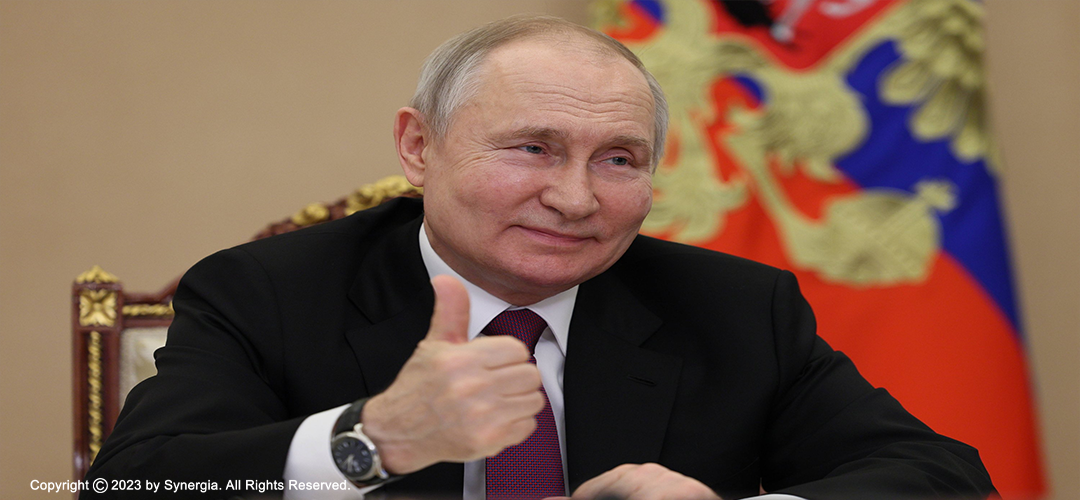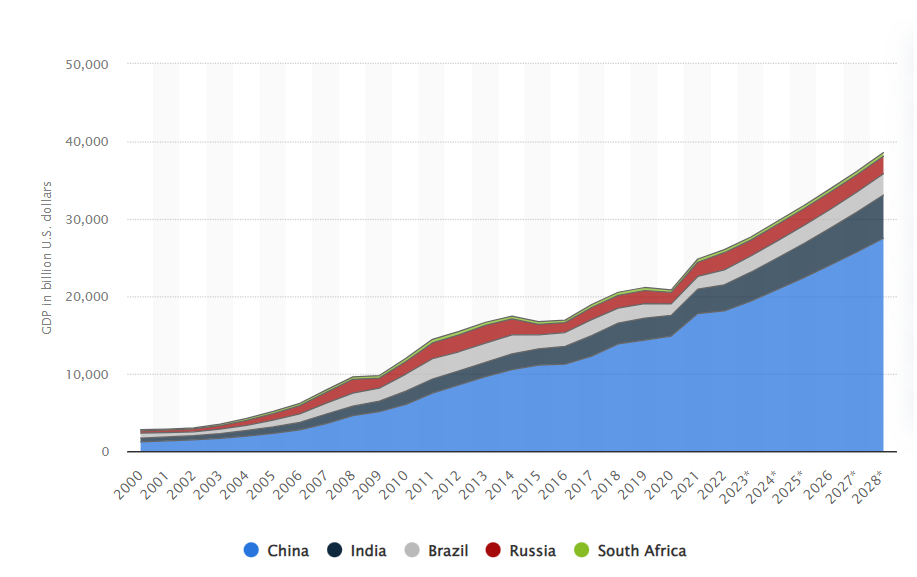Will Putin Go to South Africa?
June 9, 2023 | Expert Insights

Since it began in 2022, the Russia-Ukraine war has increasingly overturned the global geopolitical order. For one, it has done the most to divide the world into two camps-the West under the U.S. and an emerging axis between the Chinese and the Russians with North Korea and Iran aligned to them.
Then there is the third element- the Global South, with India as its leading protagonist, Brazil, and South Africa. While some may derisively call them fence sitters, it is only fair to be mindful of their national interests before throwing their lot with the West or the East.
Since Brazil, South Africa, and India are BRICS members, along with China and Russia, the upcoming BRICS summit in Johannesburg, South Africa, in August has attracted global attention, more so as the host nation has officially extended an invitation to President Putin.
So far, Kremlin has not confirmed whether President Putin will physically attend the summit.
Background
The BRICS grouping of countries is a peculiar mix of different ideologies. While the common perception is that it has failed to achieve any significant gains for its members in trade, commerce or even in gaining a geopolitical edge in the ongoing contestations, it does bring some significant emerging and existing middle powers on a common platform. While each of the BRICS countries is different, they share a common goal in economic development without geopolitical encumbrances.
Of course, within the members themselves, there is a difference; the India-China rivalry needs no elaboration. In terms of political systems, the member countries vary from true democracies to autocracies and something in between!
Their strongest hard sell is the economy- The BRICS group makes up 41 per cent of the global population and accounts for 16 per cent of world trade. The five BRICS nations now contribute nearly 31.5 per cent of global GDP (compared with 30.7 per cent by G7 countries).
Another factor that the BRICS shares under the existing geopolitical conditions is that they are either openly pro -Russia on the Ukraine war (China) or have maintained a strategic ambiguity (India, Brazil and South Africa).
Since the onus of hosting (or executing the ICC warrant) for President Putin lies in South Africa, it is important to understand its relationship with the West and Russia.
South Africa has been ambivalent in its position between Russia and the West. It has strong ties with Western countries. The West has provided all kinds of assistance to South Africa since the end of the Apartheid era. Pretoria has been the doorway for the United States and the European Union into Southern Africa and the wider African continent. Modern South Africa has historical angst against the West. During the Apartheid era, most Western countries led by the United States supported the racist regime in Pretoria either overtly or covertly. They considered the white minority rulers of South Africa as important bulwarks in the global fight against communism in the then-ongoing Cold War. The highly professional South African Defence Forces physically fought the proxies of the USSR and China in Angola, Southwest Africa, erstwhile Northern and Southern Rhodesia, and Mozambique for decades until these countries finally attained their freedom from their colonial masters. This coincided with the internal implosion within South Africa, which saw the end of the white Apartheid regime and the restoration of power to Africans. The current generation of South African rulers traces their political lineage to the ANC, which the USSR generously supported. This bond would naturally invoke sentiments of gratitude and goodwill towards Moscow.
Like the entire world, the BRICS want to end the war in Ukraine as soon as possible. With Russia being part of the organisation, perhaps BRICS leaders can use the opportunity to convince him of the futility of continuing with the war, even as Ukraine, with Western military assistance, gears up to take back by force all their territory in the East and South under Russian control. The war, if it goes as per the designs of the West, threatens to leave Russia in a far more disadvantageous situation than before the whole drama started.
No doubt BRICS has great potential, even if the same has not been realised in real terms till now. This makes its membership attractive, with Egypt, Saudi Arabia and Indonesia lining up to join the bloc.
There is consternation within some quarters in South Africa regarding the decision to invite President Putin. However, this mainly comes from the opposition, which still sees the West as the only hope for their country. But the South African government is not budging. The opposition Democratic Alliance quickly drew political mileage by lodging a court application to compel the government to arrest Mr Putin should he arrive in August. The ruling dispensation has accused them of working at the behest of the West.

Analysis
It is hardly surprising that South Africa has chosen to keep Russia on its friend's list. The West had naively thought that just because the chief prosecutor of the ICC had issued an arrest warrant against Putin and South Africa is a signatory to the ICC statute, Pretoria would be compelled to execute the arrest warrant with some cajoling and incentives. However, Pretoria is already working on a loop that will not make it binding for the country to execute the arrest warrant. A government minister was cited by the BBC World Service stating that a new law will be passed in the parliament that will give “exemptions of who to arrest and who not to arrest,"
The relevance of the ICC itself is questionable. The United States is itself not a signatory. American and other Western troops in Iraq and Afghanistan have committed numerous abuses and war crimes. There is very little possibility of any of this ever seeing the light of day in an international court. As ANC secretary general Fikile Mbalula said when a Western reporter asked about the arrest warrant against Putin, "Putin is the head of a state. Do you think that a head of state can just be arrested anywhere? How many criminal activities has your country committed in Iraq? How many have you arrested for crimes in Afghanistan and Libya?”
Then there is the legal argument. Being a signatory to the ICC places no obligations on a member country. It still has its sovereignty intact. This is because the ICC is the voluntary coming together of countries for a common cause. The ICC does not have its own law enforcement agency. As a result, it cannot just arrest a person on its own even after it has issued the proper arrest warrant. It needs the cooperation of the host state. This cooperation has not been given for most of the time throughout the history of the ICC. This is because the ICC failed to offer anything substantial to the host country in return for its cooperation. Just taking the moral high ground will not work. Realpolitik will always triumph over vague notions of international justice.
The ICC itself is a part of the global power structure in which it defers to the great powers, especially the United States. The court does not have any independent authority of its own. So, most of the time, it has gone after small fish, largely in African countries. President Putin is the first big leader it has targeted, and that too because he is not part of the Global North.
If international justice is to truly become meaningful, then all crimes should be tried, no matter what is committed by which country. All conflicts should receive equal attention. Currently, there are many wars going on in Africa. Yet the West is only focused on Ukraine because this is what matters to them.
Assessment
- The South African government has a precedent in the 1998 extradition case of General Augusto Pinochet, the brutal dictator of Chile whom the UK government refused to extradite for trial on human rights violation charges. The same logic could be applied to Mr Putin.
- The only way in which Mr Putin is ever going to sit in the docks of the International Criminal Court is if Russia is completely militarily defeated or an internal implosion violently overthrows the Putin regime and hands him over to the ICC. However, the prospects of such a dire contingency appear remote at this juncture.
- In the interim, the dilemma of the South African government in dealing with the issue is understandable. On the one hand, they risk losing lucrative commercial dealings with the West, while on the other, they cannot renege on their historical close ties with the Kremlin during the darkest days of apartheid. It is a question of between the devil and the deep. The only solution is Mr Putin politely refuses the invite or attend the summit virtually.








Comments